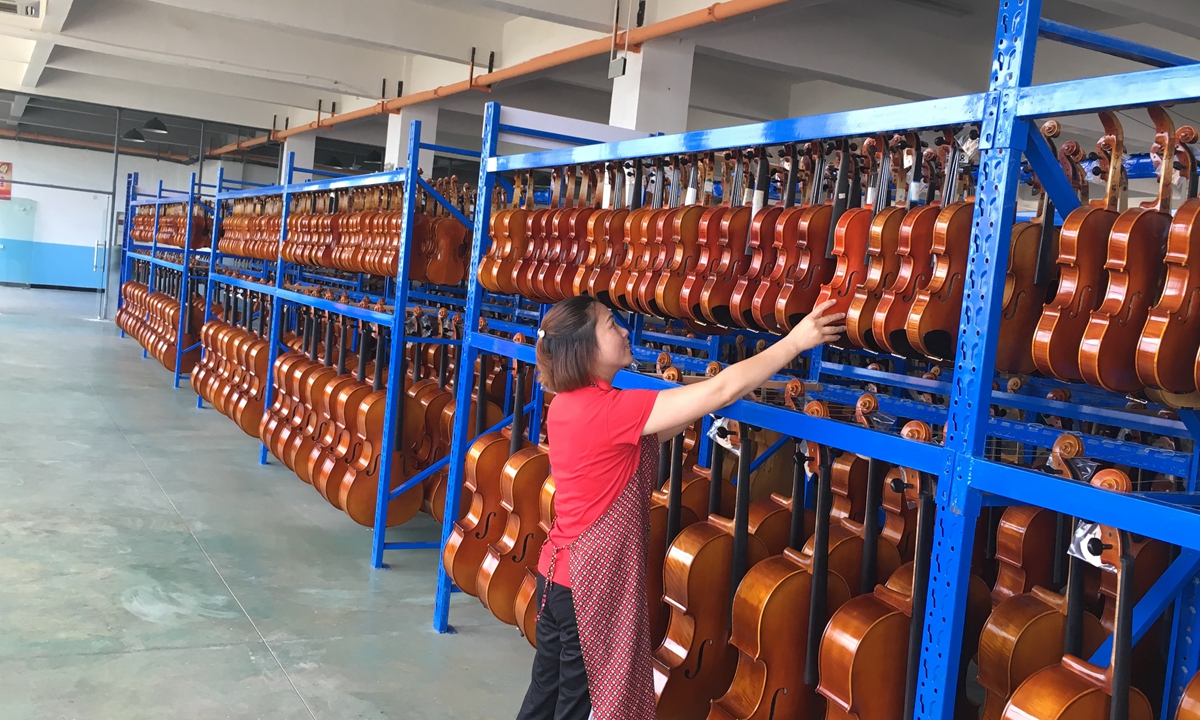‘World’s factory of violin’ trains farmers into craftsmen, lifts region out of poverty
By Shan Jie and Lu Yameng Source: Global Times Published: 2020/12/22 19:38:40

A woman checks hand-made violins at a facotry in Queshan, Central China's Henan Province. Photo: Courtesy of Guo Xinshe
Wang Jintang is the Antonio Stradivari of Zhugou village.
The violins and cellos Wang made have been played by musicians around China and the world.
Zhugou village is a community in Queshan county, Central China's Henan Province, known as the world's "factory of violins." For every 10 hand-made violins sold around the world, nine are made in Queshan.
In the 1980s, Wang spent three years acquiring the skill of making violins when he was a migrant worker in Beijing. At that time, many people in his hometown Queshan suffered from poverty. He returned to Queshan along with his new craft.
After three decades of development, Queshan now has 122 violin companies with 2,000 employees. The annual output of various violins is about 400,000, and the annual output value is about 450 million yuan ($68 million).
With Queshan's violins being sold to countries such as the US, Germany, Italy and South Korea, the county's violin industry has lifted more than 100 households out of poverty.
"Queshan violin industry has a bright future in cross-border e-commerce," a local violin manufacturer said.
Despite the global reach of the COVID-19 pandemic, online orders have connected Queshan's manufacturers with overseas clients. Queshan is also actively exploring China's domestic market.
Queshan County Violin Industrial Park has become a professional industrial park for Queshan-born violin makers in Beijing to return to their hometown to start business and help with local poverty alleviation.
"Currently there are more than 180 violin makers in the factory. Most of them were local villagers trained to become professional violin craftsmen. After training, a maker can earn about 5,000 yuan a month, which is high compared with other jobs in the local area," said Guo Xinshe, general manager of Henan Haoyun Musical Instrument Company.
The company has provided 200,000 yuan to help more than 70 poor households, with an average of about 3,000 yuan per household. In addition, the company has employed seven workers from poor families, and five disabled workers, who earned more than 3,500 yuan a month.
Guo Yongqing, a villager in the nearby Mazhuang community, is a disabled worker in the factory. His family is listed by the local government as low-income. "I can now earn more than 3,000 yuan a month in the factory, which is almost six times the salary of my previous job as a cleaner in the village," said Guo.
The violins not only brought financial wealth, but expanded opportunities for the next generations in Queshan. "Parents make violins and children are playing them" is a very common scene in the county where people could barely name the Western instrument 30 years ago.
"We have made the world know Queshan violins, and our children have the duty to continue spreading the notes to every corner of the world," said Jiang Baolin, chief of the Queshan hand-made violin association, in the documentary The Last Battle Against Poverty by Henan TV.
Thanks to the popularity of the internet and mobile phones and policy support, e-commerce has been developing rapidly in China. Even the most remote villages in China have Wi-Fi and access to the 4G network, and in some cases, 5G. As a result poverty reduction initiatives across China have gone global, much like Queshan's violin industry.
For instance, a special species of pomegranates with soft seeds arrived at the Russian market from Liangshan Yi Autonomous Prefecture, Southwest China's Sichuan Province, one of China's least-developed regions that just shook off poverty in November. As early as 2018, pollution-free tomatoes and peppers of Liangshan have been exported to Russia and Kazakhstan.
In 2019, China exported 2 billion yuan of goods like food, wine, vinegar and tobacco in cross-border e-commerce. Cross-border e-commerce is an innovative mode of China's poverty alleviation work, read a report published by the Ministry of Agriculture and Rural Affairs in September. Rice noodles, traditional Chinese medicine herbs, tea leaves, fruits and flowers are popular products among international clients.
In 2012, China launched a full-scale battle against poverty. After eight years of efforts, nearly 100 million poor people in rural areas have been lifted out of poverty. According to the World Bank, China has contributed to nearly 70 percent of the world's extreme poverty reduction, a feat lauded by independent economists.
Newspaper headline: Crescendo of uplift
RELATED ARTICLES:
Posted in: IN-DEPTH